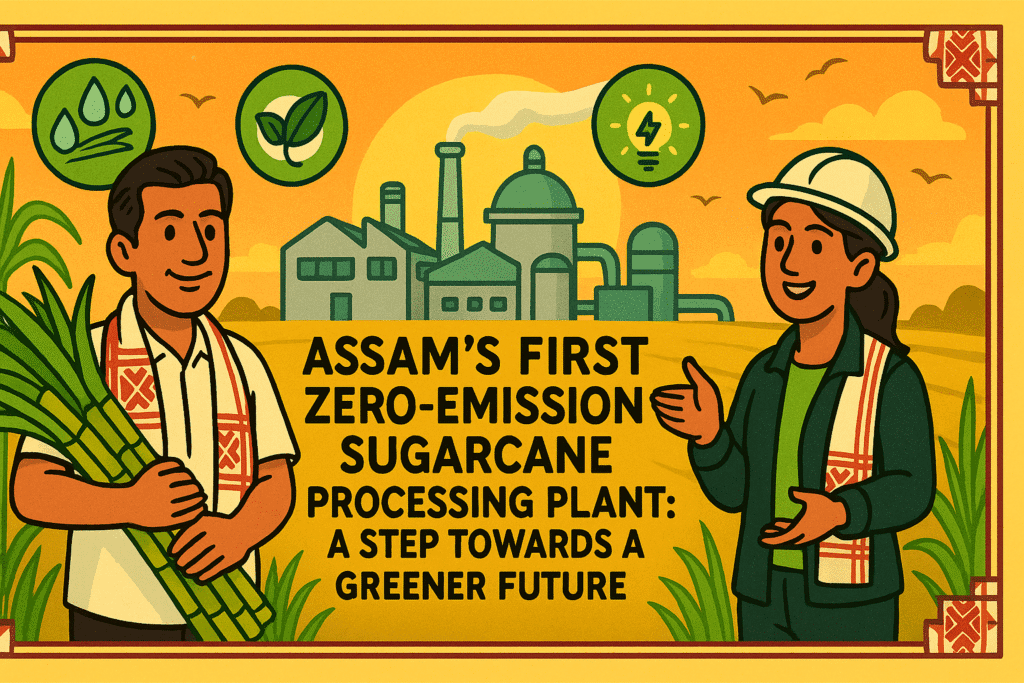
A groundbreaking development in Assam is setting a new benchmark for sustainable agriculture and industrial practices. The state has become home to India’s first zero-emission sugarcane processing plant, developed by Spray Engineering Devices Limited (SEDL). Located at Bamungaon near Guwahati, this innovative facility is transforming how sugarcane is processed while promoting environmental sustainability and empowering thousands of farmers.
Table of Contents
Revolutionizing Sugarcane Processing

The SEDL plant uses cutting-edge technology that eliminates the need for traditional boilers, making it 100% fuel-free. Instead of burning biomass like bagasse, which is a common practice in conventional sugar mills, this plant utilizes advanced techniques such as Mechanical Vapour Recompression and Low-Temperature Evaporation. These methods allow the plant to process over 1.8 lakh tonnes of sugarcane annually without generating harmful emissions.
By preventing the burning of 60,000 tonnes of biomass, the plant significantly reduces air pollution and contributes to cleaner surroundings. Additionally, all recovered water from the process is recycled for irrigation on organic sugarcane farms, further conserving natural resources. Solar power is also integrated into operations, minimizing the plant’s carbon footprint.
Empowering Farmers and Boosting Rural Economy
The project not only benefits the environment but also supports around 8,000 organic farmers in Assam. These farmers receive training, fair pricing, and transparent procurement policies, ensuring their livelihoods are secure and sustainable. The initiative aligns with India’s vision for energy security and climate action while uplifting rural communities through inclusive growth.
🔹 For more insightful articles and updates on current affairs, feel free to explore our website through this link.
A Model for Green Hydrocarbon Economy
One of the most remarkable aspects of this innovation is its potential to unlock a $500 billion green hydrocarbon economy. By maximizing the value of every part of the sugarcane plant, the system produces ethanol, 2G ethanol from cellulose-rich bagasse, and even green hydrogen and biochemicals from other residues. This closed-loop ecosystem aims to replace fossil fuels with locally sourced, cost-effective alternatives, paving the way for a more sustainable future.
Leading Global Standards in Jaggery Production
The Guwahati unit is also India’s only zero-emission jaggery production facility, operating at a crushing capacity of 500 tonnes per day. Fully automated and running successfully for the past four years, it represents a paradigm shift in food manufacturing. Unlike traditional methods, this plant operates without combustion, flue gases, or wastewater discharge, producing clean, high-quality jaggery that meets global standards.
According to Vivek Verma, Managing Director of SEDL, “Our system removes the need for boilers, making the plant 100% fuel-free and helping achieve the goal of zero carbon emission.” He emphasized that such innovations can strengthen India’s leadership in clean and sustainable food manufacturing.
India exported 5,16,746 metric tonnes of jaggery worth Rs 3,570 crore in 2023-24, showcasing the product’s growing demand worldwide. Facilities like the one in Assam can enhance India’s position as a leader in eco-friendly agricultural exports.
🔹 Explore the vibrant history and culture of Punjab, from its ancient roots to its modern traditions, by diving into our detailed articles—click here to learn more!
Static GK Section
Chief Minister of Assam:
As of now, the Chief Minister of Assam is Himanta Biswa Sarma . He took office in May 2021 and has been instrumental in driving several developmental initiatives in the state.
Governor of Assam:
The current Governor of Assam is Lakshman Acharya. Appointed by the President of India, the Governor serves as the constitutional head of the state.
Capital of Assam:
The capital city of Assam is Dispur , located near Guwahati. It serves as the administrative hub of the state and houses important government offices.
This pioneering effort by SEDL highlights how technological advancements can address pressing environmental challenges while fostering economic prosperity. With initiatives like these, Assam is poised to lead India toward a greener and brighter future.
